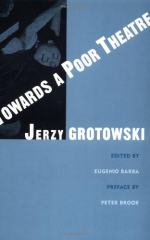
|
Towards a Poor Theatre
1. Who wrote the preface to "Towards a Poor Theatre"?
(a) Samuel Beckett.
(b) Peter Brook.
(c) Jerzy Grotowski.
(d) Lans Sosnowski.
2. When was the interview in "Towards a Poor Theatre" (Chapter 1) first published?
(a) 1966.
(b) 1962.
(c) 1965.
(d) 1960.
3. How does Grotowski claim to feel when asked, "What is the origin of your experimental theatre productions?"
(a) Hesitant.
(b) Impatient.
(c) Eager.
(d) Happy.
4. What is the name of Grotowski's school?
(a) The Box.
(b) The Actor's Studio.
(c) The Laboratory.
(d) Theatre of Cruelty.
5. What does Grotowski say that he and his actors are trying to avoid in "Towards a Poor Theatre" (Chapter 1)?
(a) Tradition.
(b) Eclecticism.
(c) Avant-garde.
(d) Progress.
6. Grotowski claims in "Towards a Poor Theatre" (Chapter 1) that his productions are detailed investigations of the _____ relationship.
(a) Director-producer.
(b) Director-audience.
(c) Actor-audience.
(d) Actor-director.
7. Who does Grotowski say asked the key methodological questions of acting in "Towards a Poor Theatre" (Chapter 1)?
(a) Stanislavski.
(b) Brecht.
(c) Artaud.
(d) Chekhov.
8. Whose rhythm exercises does Grotowski find most important?
(a) Dullin's.
(b) Brecht's.
(c) Delsarte's.
(d) Stanislavski's.
(read all 180 Multiple Choice Questions and Answers)
|
This section contains 3,741 words (approx. 13 pages at 300 words per page) |

|




